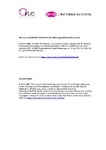Alternating Minimization for Wideband Multiuser IRS-Aided MIMO Systems Under Imperfect CSI

Use este enlace para citar
http://hdl.handle.net/2183/34579Coleccións
- GI-GTEC - Artigos [193]
Metadatos
Mostrar o rexistro completo do ítemTítulo
Alternating Minimization for Wideband Multiuser IRS-Aided MIMO Systems Under Imperfect CSIAutor(es)
Data
2023-11-28Cita bibliográfica
D. Pérez-Adán, M. Joham, Ó. Fresnedo, J. P. González-Coma, L. Castedo and W. Utschick, "Alternating Minimization for Wideband Multiuser IRS-Aided MIMO Systems Under Imperfect CSI," in IEEE Transactions on Signal Processing, vol. 72, pp. 99-114, 2024, doi: 10.1109/TSP.2023.3336166.
É version de
https://doi.org/10.1109/TSP.2023.3336166
Resumo
[Abstract]: This work focuses on wideband intelligent reflecting surface (IRS)-aided multiuser MIMO systems. One of the major challenges of this scenario is the joint design of the frequency-dependent base station (BS) precoder and user filters, and the IRS phase-shift matrix which is frequency flat and common to all the users. In addition, we consider that the channel state information (CSI) is imperfect at both the transmitter and the receivers. A statistical model for the imperfect CSI is developed and exploited for the system design. A minimum mean square error (MMSE) approach is followed to determine the IRS phase-shift matrix, the transmit precoders, and the receiving filters. The broadcast (BC)- multiple access channel (MAC) duality is used to solve the optimization problem following an alternating minimization approach. Numerical results show that the proposed approach leads to substantial performance gains with respect to baseline strategies that neglect the inter-user interference and do not optimize the IRS phase-shift matrix. Further performance gains are obtained when incorporating into the system design the statistical information of the channel estimation errors.
Palabras chave
Downlink
MmWave
IRSs
Wideband
BC-MAC duality
Imperfect CSI
Multiuser
Multistream
MmWave
IRSs
Wideband
BC-MAC duality
Imperfect CSI
Multiuser
Multistream
Descrición
© 2023 IEEE. This version of the article has been accepted for publication, after peer review. Personal use of this material is permitted. Permission from IEEE must be obtained for all other uses, in any current or future media, including reprinting/republishing this material for advertising or promotional purposes, creating new collective works, for resale or redistribution to servers or lists, or reuse of any copyrighted component of this work in other works. The Version of Record is available online at: https://doi.org/10.1109/TSP.2023.3336166
Versión do editor
Dereitos
© 2023 IEEE. All rights reserved. Todos os dereitos reservados.
ISSN
1053-587X





